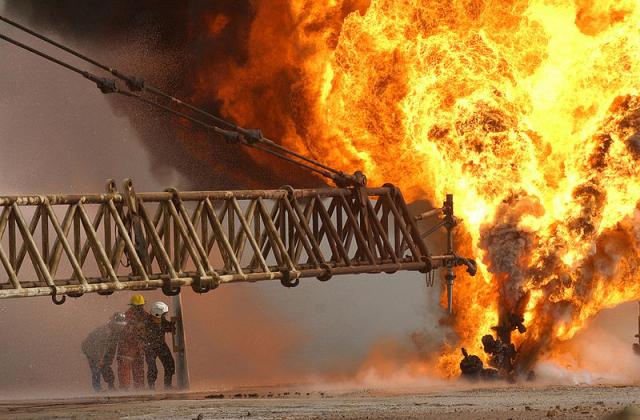Just a few weeks after President Barack Obama announced U.S. troops are “leaving” the war-torn country, ExxonMobil and Shell each announced major new oil and gas production agreements in Iraq.
On November 12, ExxonMobil signed an oil production deal with the Kurdish Regional Government to drill in Iraqi Kurdistan, located in northern Iraq. This comes on top of an existing oil deal it landed in 2009, to drill for oil in the West Qurna Field, located in southern Iraq.
The New York Times explained both deals:
Exxon and its partners agreed to invest $50 billion over seven years to increase output by about two million barrels of oil per day there, at West Qurna Phase 1, bringing more new oil to market than the United States currently produces in the Gulf of Mexico. Margins, though, are low. Kurdistan offers more lucrative production-sharing agreements, allowing the company to earn a larger share of revenues and to count more of the crude on its books, which helps boost stock prices.
Days later on November 15, Royal Dutch Shell signed a $17 billion natural gas production deal with the Iraqi government. Shell will utilize the natural gas by-product from oil produced at the West Qurna Field, the Rumaila Field, and the Az Zubair Field, and transform it into a usable product. “Shell said it would sell the gas to electrical utilities in Iraq, but that it may also eventually export some,” explained The New York Times.
Reuters further explained the specter of an LNG (liquefied natural gas) export deal in the Shell contract, writing,
Iraqi officials have said the project could include building an LNG export facility with a maximum capacity of 600 million cubic feet of gas per day, so long as Iraq’s own gas needs are satisfied first
(Snip)
A summary of the official agreement obtained by Reuters after the initial signing in July lists a $4.4 billion LNG export unit, in addition to the $12.8 billion estimated cost of rehabilitating existing gas facilities and building new ones, but it does not say when the LNG plant might be built.
U.S. Troops Leaving Iraq? Not quite
Critical observers understand full well that the U.S. won’t be “leaving” Iraq anytime soon, of course. Instead, up to 3,000 troops will be moved, en masse, into neighboring Kuwait, on top of the already existing 29,000 troops stationed in the small Gulf state. Kuwait is home to seven U.S. military bases.
Furthermore, scores of “peacekeeping forces” will remain inside of Iraq itself. On top of that, untold number of “security forces,” also known as private mercenaries, made infamous by Blackwater USA (now XE Services LLC), will also remain inside of Iraq.
A Familiar Pattern: History Repeats Itself
Weeks ago, I uncovered a parallel oil war the United States launced in Uganda, the eastern African country that borders Lake Albert and the Albertine Basin, which sits on 2.5 million barrels of oil and is home to a key U.S. military base at Entebbe International Airport.
ExxonMobil is a key player looking to profit from Uganda’s resource curse, and it likely is also teaming up with the powerful mercenary army Saracen International, which is co-owned by Blackwater founder Erik Prince and Salim Saleh, the brother of Uganda’s President, Yoweri Museveni.
Saracen Interntional is a split-off of one of the first mercenary armies of the modern era, Executive Outcomes, which was owned by Tony Buckingham, who now owns Heritage Oil. Heritage, my article explains, along with ExxonMobil, has been working overtime together to secure oil production deals in the Albertine Basin, as seen through the lense of Wikileaks’ U.S. State Department diplomatic cables.
History, then, is repeating itself in Iraq, with the familiar ingredients, including oil, natural gas, mercenary forces, and key military bases, all in place.
Subscribe to our newsletter
Stay up to date with DeSmog news and alerts







